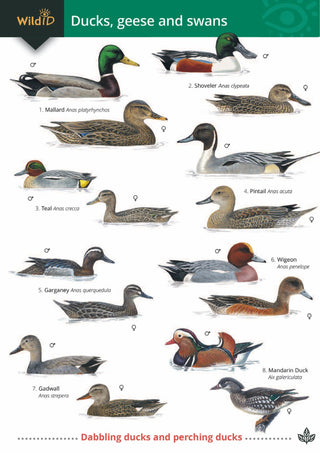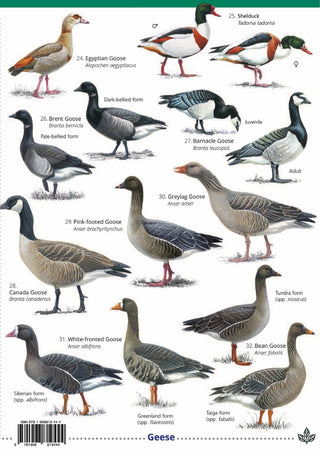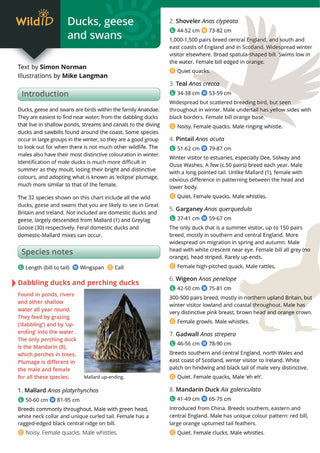Visiting a wetland bird reserve? Or maybe you just need a quick reference guide to the identification of the birds you see at a local pond?
The FSC Ducks, Geese and Swans fold-out guide could be the answer! It features all 32 of the wild waterfowl seen in Britain and Ireland. Designed for use outside, this laminated fold-out guide features beautiful colour paintings by leading bird artist Mike Langman.
For rapid identification, we have grouped the paintings by dabbling ducks, diving ducks, sawbills, swans and geese. Also included are different forms for males, females and juveniles where appropriate.As well as the paintings, the reverse side of the ducks guide includes concise identification notes for each species.
This text covers the distinguishing features to look out for, plus body size, wingspan and the call of each species. Ducks, geese and swans are birds within the Anatidae family. They are easiest to find near water. Dabbling ducks like mallard and teal are common across the country in shallow ponds, streams and canals. They feed by grazing dabbling and up-ending into the water.
By contrast, diving ducks and sawbills are more frequent at the coast, but sometimes they occur inland. Various species gather in large groups in the winter, so they are a good group to look out for when there is not much other wildlife! Many are winter visitors.
During spring and autumn migration, many species may be seen flying overhead or out at sea. Garganey is the only duck that is a summer visitor, although of course resident waterfowl can be seen all year round. From mallard to mute swan, from shoveler to shelduck, this fold-out guide features all 32 of the wild waterfowl seen in Britain and Ireland.
Visiting a wetland bird reserve? Or maybe you just need a quick reference guide to the identification of the birds you see at a local pond?
The FSC Ducks, Geese and Swans fold-out guide could be the answer! It features all 32 of the wild waterfowl seen in Britain and Ireland. Designed for use outside, this laminated fold-out guide features beautiful colour paintings by leading bird artist Mike Langman.
For rapid identification, we have grouped the paintings by dabbling ducks, diving ducks, sawbills, swans and geese. Also included are different forms for males, females and juveniles where appropriate.As well as the paintings, the reverse side of the ducks guide includes concise identification notes for each species.
This text covers the distinguishing features to look out for, plus body size, wingspan and the call of each species. Ducks, geese and swans are birds within the Anatidae family. They are easiest to find near water. Dabbling ducks like mallard and teal are common across the country in shallow ponds, streams and canals. They feed by grazing dabbling and up-ending into the water.
By contrast, diving ducks and sawbills are more frequent at the coast, but sometimes they occur inland. Various species gather in large groups in the winter, so they are a good group to look out for when there is not much other wildlife! Many are winter visitors.
During spring and autumn migration, many species may be seen flying overhead or out at sea. Garganey is the only duck that is a summer visitor, although of course resident waterfowl can be seen all year round. From mallard to mute swan, from shoveler to shelduck, this fold-out guide features all 32 of the wild waterfowl seen in Britain and Ireland.



